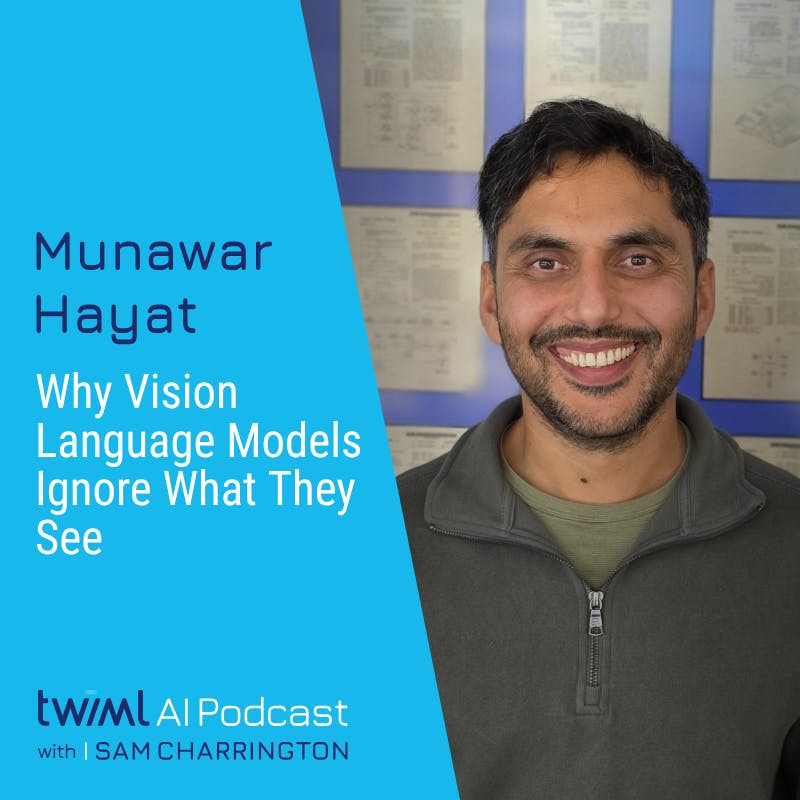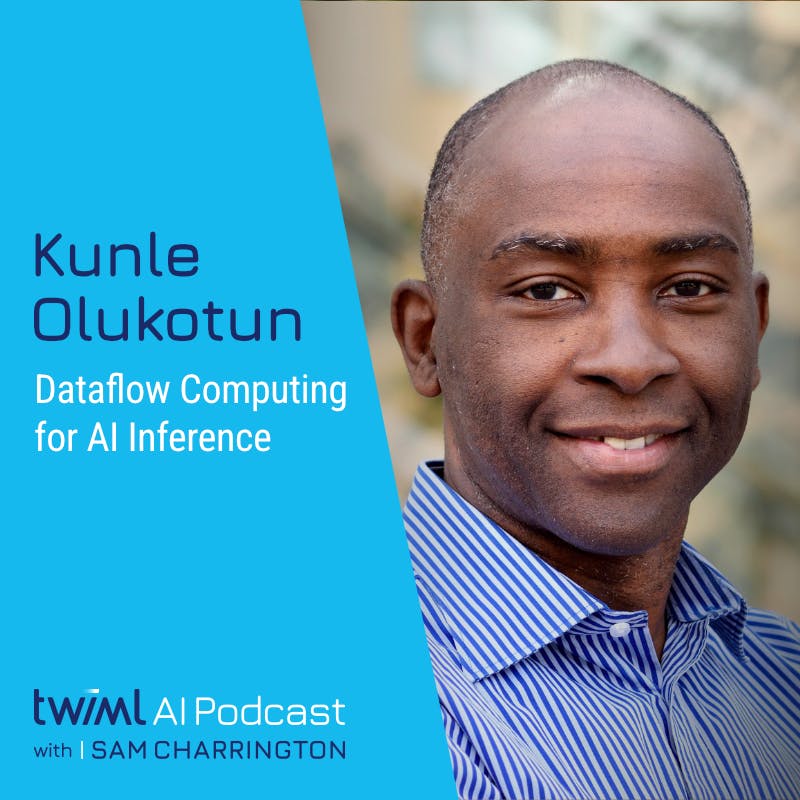Today's Top Episodes
Viewing Podcast: Podcast
AI
Arts
Business
Crypto
Finance
Health
History
Interviews
Investing
Macro
Misc
News
Politics
Product
Programming
Science
Social
Startups
Technology
VC

Rethinking Pre-Training for Agentic AI with Aakanksha Chowdhery - #759
Duration: 00:52:54
December 17, 2025
- Pre-training needs a fundamental rethinking for agentic capabilities, moving beyond static benchmarks to focus on environmental interaction and multi-step goal achievement.
- Enhancing agentic capabilities requires advancements in attention mechanisms and training data quality, moving beyond next-token prediction to foster planning and long-form reasoning.
- Developing robust agentic systems necessitates new measurement benchmarks that capture complex capabilities like long-form reasoning, mistake recovery, and tool learning, rather than relying solely on existing post-training techniques.

Why Vision Language Models Ignore What They See with Munawar Hayat - #758
Duration: 00:57:40
December 9, 2025
- Vision-language models struggle with physics-based generation, often failing to maintain object properties like shape and size after operations like unstacking.
- A significant challenge in vision-language models is that the language component often dominates, leading models to rely on parametric memory rather than actual visual content for responses.
- Research is exploring methods to improve multimodal retrieval and generation by enhancing how different modalities interact, including improved attention mechanisms and enriched embedding spaces for queries involving both text and images.

Scaling Agentic Inference Across Heterogeneous Compute with Zain Asgar - #757
Duration: 00:48:44
December 2, 2025
- The conversation highlights the growing trend of building vertically integrated systems for AI training hardware, drawing parallels to the supercomputer era, but questions if this is the optimal path for inference.
- A key focus is on optimizing agentic AI workloads by orchestrating and efficiently utilizing heterogeneous hardware, aiming for a significant reduction in cost per token and improved performance.
- For inference, the discussion emphasizes the benefits of large-scale, heterogeneous systems composed of commodity hardware, enabling efficient scaling and cost optimization, particularly where traditional, monolithic "supercomputer" approaches to training hardware may not be ideal.

Proactive Agents for the Web with Devi Parikh - #756
Duration: 00:56:04
November 18, 2025
- The future of web interaction will shift from clicking and form-filling to describing desired outcomes, with AI agents proactively executing workflows in the background.
- Utori's product "Scouts" enables users to monitor the web for specific information and provides a foundation for future automation, moving beyond simple notifications to performing actions.
- The development of reliable web agents requires innovating across the entire technology stack, from underlying models to product experiences, with a visually grounded approach proving more scalable and robust than DOM-based methods.

AI Orchestration for Smart Cities and the Enterprise with Robin Braun and Luke Norris - #755
Duration: 00:54:46
November 12, 2025
- The primary focus for enterprise AI adoption has shifted from an initial "AI mandate" to demonstrating tangible return on investment (ROI), with organizations seeking concrete results before scaling further.
- Chatbots, while a visible AI application, are considered less impactful than back-office automation, which leverages generative AI to streamline processes in finance, HR, and procurement, delivering rapid ROIs.
- The key to successful enterprise AI lies in making data actionable quickly, rather than investing heavily in upfront data cleansing, and leveraging agentic capabilities to address specific business problems incrementally ("mud puddle by mud puddle").

Building an AI Mathematician with Carina Hong - #754
Duration: 00:55:52
November 4, 2025
- The convergence of AI, programming languages, and mathematics is creating a unique moment for advancing mathematical reasoning.
- Lean, a formal language and programming language, is key to making mathematical reasoning more rigorous and verifiable by computers, akin to compiling a program.
- Auto-formalization, the process of converting natural language mathematical proofs into formal language, is a critical but challenging technology for bridging the gap between human intuition and machine verification.

High-Efficiency Diffusion Models for On-Device Image Generation and Editing with Hung Bui - #753
Duration: 00:52:23
October 28, 2025
- The conversation highlights the development of highly efficient AI models, including achieving better performance with smaller parameter counts (under 4 billion) compared to larger ones.
- A significant research effort focuses on making generative AI models like diffusion models more efficient, specifically by developing one-step image generation (Swift Brush) and editing (Swift Edit) techniques to drastically reduce processing time.
- The discussion emphasizes the critical role of on-device AI and efficiency for personalized agents, especially in processing private data locally and minimizing battery consumption on mobile devices.

Vibe Coding's Uncanny Valley with Alexandre Pesant - #752
Duration: 01:12:06
October 22, 2025
- Vibe coding is rapidly advancing, blurring the lines between natural language and programming, akin to how image and video generation has moved past the uncanny valley.
- The core value proposition of vibe coding is enabling individuals to build software without traditional coding knowledge, democratizing software development for the "99%" by allowing them to express ideas in English and have them translated into code.
- Successful use of vibe coding requires a combination of clear intent, strategic planning (akin to product management), and effective communication with AI models, emphasizing that while tools are powerful, human direction and understanding of sequencing remain crucial.

Dataflow Computing for AI Inference with Kunle Olukotun - #751
Duration: 00:56:37
October 14, 2025
- Reconfigurable data flow architectures are designed to match the data flow graphs of AI algorithms directly in hardware, offering a paradigm shift from traditional instruction-based computing by reconfiguring hardware to execute specific computational graphs.
- This architecture excels at fast and energy-efficient inference for large language models by minimizing memory bandwidth usage and maximizing hardware utilization through techniques like fusing entire model components.
- The approach supports dynamic AI systems and agentic workflows through capabilities like rapid model switching and the development of specialized compiler infrastructure, pushing towards systems that can adapt more fluidly to changing computational demands.

Recurrence and Attention for Long-Context Transformers with Jacob Buckman - #750
Duration: 00:57:23
October 7, 2025
- The discussion highlights the importance of context length as a crucial axis of scale for AI models, distinct from simply increasing parameters or data set size.
- A key architectural innovation discussed is "retention," which combines the strengths of recurrent models (linear cost with context length) and attention mechanisms (parallelization and hardware efficiency) by using a chunked algorithm.
- The conversation emphasizes the need for a balanced architecture regarding the ratio between flops spent on parameter-based calculations and state-based calculations, arguing that imbalance can hinder compute optimality.




